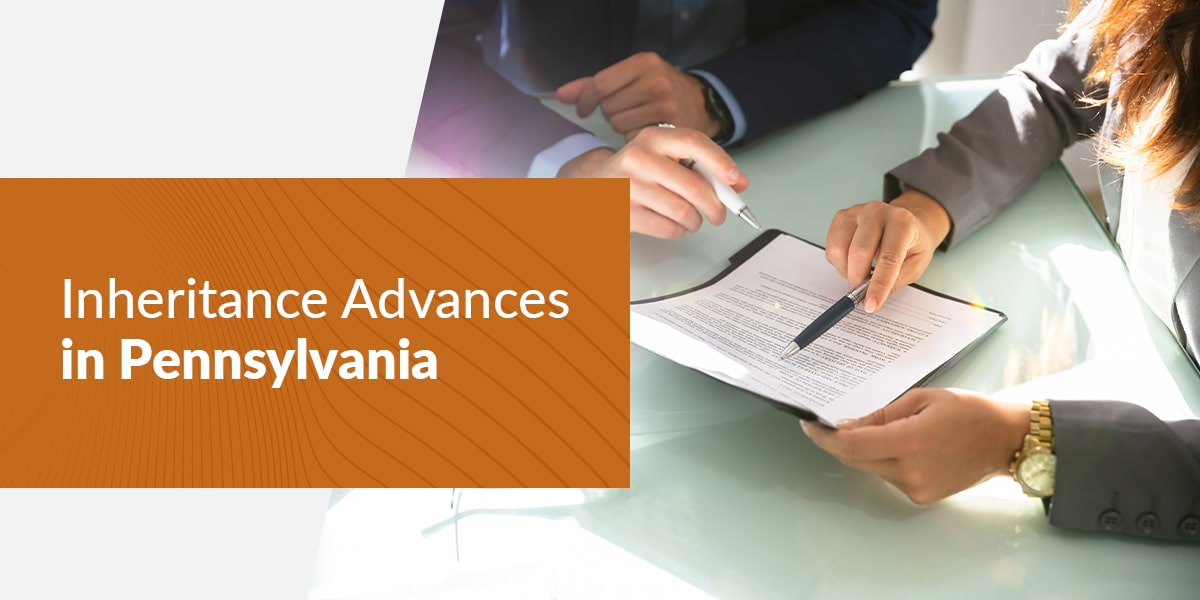Pennsylvania Probate | Inheritance Advances in Pennsylvania
Probate Process in Pennsylvania
Upon the death of a Pennsylvanian resident, Pennsylvania probate law dictates the distribution of all assets and belongings left behind. They first appoint a representative, also called an executor, to be in charge of the estate. The executor also collects and creates a list of all assets and monetary accounts, oversees all outstanding debts to ensure they are paid off and determines whether any existing wills are valid. Finally, when probate courts are satisfied that an heir has completed all required steps, the rightful heirs receive their inheritance funds.
The Steps for Settling an Estate in Pennsylvania
In most cases, the steps for settling an estate in Pennsylvania include:
- Locating the will: The decedent’s family members or a personal representative named in the will must find the document, which is typically in the individual’s home or another secure location, like a safety deposit box.
- Arranging the burial: The personal representative should make funeral arrangements and relative plans as outlined in the will.
- Filing the probate petition: The personal representative should present the will to the Register of Wills in the jurisdiction where the decedent resided for authentication.
- Appointing the executor: Assuming the will is deemed valid, the Register will officially appoint the executor or administrator to oversee the estate.
- Listing and appraising assets: The executor or administrator is responsible for appraising the decedent’s tangible and intangible assets and assigning value to them.
- Distributing assets: Upon appraising the decedent’s assets and paying any outstanding debts and taxes, the executor should distribute the assets according to the will’s instruction. If there is no will, Pennsylvania law determines the distribution process.
- Filing a final account: The executor must file an account with the court outlining all applicable transactions and expenses and providing a final balance.
- Closing the estate: The executor will address outstanding issues and obtain a court order to discharge their obligation.
Is Probate Required in Pennsylvania?
Pennsylvania law typically requires probate for most estates. However, many people find ways to avoid the probate process. Losing a loved one is difficult enough, so taking steps like applying for an inheritance advance or establishing a living trust can help you receive your inheritance without waiting for the lengthy probate process.
Pennsylvania probate law allows for a more simplified process for small estates. Those that contain less than $50,000 in assets qualify for the simplified process. The $50,000 asset limit does not include funeral funds or real estate.
How Long Does Probate Take in Pennsylvania?
In a typical Pennsylvania probate scenario, the first step involves preparing and filing the probate petition, which can take up to four months. All creditors must receive notice of the decedent’s will, which may require six to 12 months. Upon locating the creditors, it’s necessary to pay any outstanding debts and fees, which may take six to 12 months.
Inventorying the estate’s assets is another crucial component of the will that can require up to one year to complete. The process of distributing these assets may take as long as 18 months. Finally, settling and closing can require nine to 24 months, especially for larger or more complex estates.
How Much Does Probate Cost in Pennsylvania?
Unlike many other states, Pennsylvania has no published, court-approved probate fee schedule. Instead, attorneys and fiduciaries rely on a schedule stemming from a 1983 court case in Chester County, the matter of Johnson Estate. This ruling established a graduated fee schedule that the Attorney General would deem reasonable.
When adhering to Johnson Estate, attorneys typically use the valuation of the gross estate — the value of the property owned by the decedent, including debts — in a tiered system when calculating the fee. As the value increases, the fee percentage charged by the attorney decreases proportionally.
For example, the allowable fee for an estate with a maximum marginal value of $25,000 is 7%. For an estate with a maximum marginal value of $5 million, the fee would be 0.5%.
Other applicable expenses include standard probate fees, typically paid directly from the estate, and various court, executor or administrator, appraisal and miscellaneous costs.
How Do You Avoid Probate in Pennsylvania?
The probate process can be long, stressful and expensive. After the death of a loved one, the family may have to deal with unexpected expenses such as property taxes, mortgage payments and home upkeep and maintenance costs. Therefore, many people desire to avoid probate to receive their inheritance faster.
An heir can include the estate in a living trust with named beneficiaries to avoid Probate in Pennsylvania. Further, heirs can exclude some assets. Assets that have named beneficiaries allow heirs to bypass probate and claim ownership. Examples of such assets include:
- Life insurance policies
- Bank accounts
- Retirement accounts
- Vehicles
- Real estate
- Joint-owned assets
- Payable on death designations
- Transfer on death items
An heir must also establish a successor trustee for when they pass away and establish ownership in the trust. The trust then controls these assets, and the successor trustee can avoid the probate process.
How Long Do You Have to File Probate After Death in Pennsylvania?
Pennsylvania probate law has no defined deadline for filing for probate after a loved one’s death. However, there are some specific benchmarks an heir should be aware of:
- Three months after death: Three months after a descendant’s death, an heir should notify others, including banks, insurance companies and employers. Begin assessing the descendant’s assets and liabilities and notify any beneficiaries. Three months is also the deadline for receiving a 5% discount on inheritance taxes.
- Six months: Within six months of a loved one’s death, an heir should estimate how much money is required to pay debts and taxes. An heir should also document an estate’s inventory with the Register of Wills, or the official who determines whether a will is valid.
- Nine months: Pennsylvania inheritance tax returns are due within nine months of someone’s death.
What Happens When Someone Dies Without a Will in Pennsylvania?
Pennsylvania has some of the strictest laws in the U.S. for what constitutes a valid will, and the probate process determines whether a will is valid. Anyone over the age of 18 years old and who has the mental capacity to understand what they own and their heirs can write a will. Having a will is important, as the state will determine who a descendant’s heirs are if they die without a will.
Two minimum witnesses must be present to sign. A will must include:
- An estate executor, or the person responsible for ensuring your wishes are met and your debt is paid off
- Heirs for different assets
- Any additional beneficiaries in case the original ones you selected precede you in death
- Guardians for any children or pets
It’s also a good idea to include a self-proving affidavit in your will, a sworn statement that affirms the will’s validity. Typically, Pennsylvania probate law requires that a witness appear in court or provide a sworn statement to attest to the validity of a will. A self-proving affidavit can expedite the Pennsylvania probate process, as your witnesses can skip appearing in court.
Under Pennsylvania probate law, the state will typically decide your assets will go to your closest relatives. These laws are called intestate succession laws and typically cover assets that the descendant solely owned. Assets that don’t go through your will are also not impacted by intestate succession laws.
Who your assets go to depends on which closest family members are still alive when you die. For example, if you have:
- Children and no spouse: Your children inherit your assets.
- A spouse and no children or parents: Your spouse inherits all your assets.
- A spouse and children from you and that person: Your spouse will inherit the first $30,000 of your assets covered by intestate succession laws in addition to half of that balance. Your children will receive all other assets.
- A spouse and children from you and another person: Your spouse will inherit half of your assets included in interstate laws. Your children will receive everything else.
- A spouse and parents: Just like when you have a spouse and children with that spouse, your spouse will inherit the first $30,000 of interstate assets plus half that balance if a spouse and parents outlive you. However, your parents will only inherit all other assets covered under intestate laws.
- Siblings but no spouse, children or parents: Your siblings will inherit all your assets.
You must include any legally married spouse in your inheritance, regardless of whether you’re separated.
How to Determine Next of Kin in Pennsylvania
In estate planning and probate, “next of kin” refers to the decedent’s closest living blood relative. Pennsylvania law establishes the order in which these individuals are eligible to receive a share of the inheritance in situations where the decedent passes away without a will:
- Surviving spouse
- Adult children (or grandchildren if applicable)
- Parents
- Siblings
- Siblings’ children
- Grandparents
- Unclesaunts
- Children of uncles and aunts
- Commonwealth of Pennsylvania
The process involves going down the list until finding a living person in the appropriate category. For example, if the decedent has no surviving spouse or adult children, the living parents would be first in line to receive the inheritance.
Each person in the same succession classification has the same rights to the inheritance. As an example, if the decedent had three adult children, each child would be entitled to a one-third share of the estate.
Does Pennsylvania Have an Inheritance or Estate Tax?
A state collects inheritance tax on the assets an heir inherits. With an inheritance tax, the heir is responsible for paying the state. It differs from an estate tax in that the latter is a tax on a deceased person’s estate before beneficiaries can receive assets. An executor files this tax, paying it out of the estate’s funds. Because an heir is responsible for paying inheritance tax, the beneficiaries should know the inheritance tax form they need to file.
Pennsylvania is one of only six states that has an inheritance tax. The other states that have an inheritance tax include Iowa, Kentucky, Nebraska, New Jersey and Maryland, which is the only state with both an inheritance and estate tax.
Inheritance taxes must be paid within nine months of a descendant’s death. However, an heir can apply for an extension. Families can also receive a 5% discount if they pay the tax within three months of a descendant’s death.
Pennsylvania inheritance law specifies four different rates:
- 0%: Transfers to a spouse, parent from a child younger than age 21 or a minor younger than 21
- 4.5%: Transfers to lineal heirs and direct descendants
- 12%: Transfers to siblings
- 15%: Transfers to other heirs excluding charities, tax-exempt government institutions and other exempt institutions
Access Your Inheritance in Pennsylvania Immediately
During the lengthy Pennsylvania probate process, heirs cannot access the money their loved one meant for them to have. However, with an inheritance advance from Inheritance Funding Company, Inc., you can access your inheritance right away through a fast and easy process.
Dealing with the grief of losing a loved one is stressful enough. You shouldn’t have to worry about bills, car payments or home repairs during this time. An inheritance advance will let you decide how much of your inheritance you’d like to receive immediately, and you can use the money however you’d like. An inheritance advance is also not a loan — once you receive your money, there’s no need to pay us back and no interest rate.
With decades of experience and over $200 million advanced to heirs in all 50 states and Washington, D.C., we have the expertise and size to help you get your money in as little as 24 hours. Our friendly staff can give you a free, no-obligation consultation, walking you through the Pennsylvania probate process and answering any questions you may have.
Your loved one desired that you inherit their assets after their death. Contact Inheritance Funding today to access what’s yours.
Why Wait? Get Your Inheritance Now!
To get started,
give us a call directly or fill out the form to receive your free consultation.
 1-800-944-2072
1-800-944-2072
Free inheritance funding consultation









